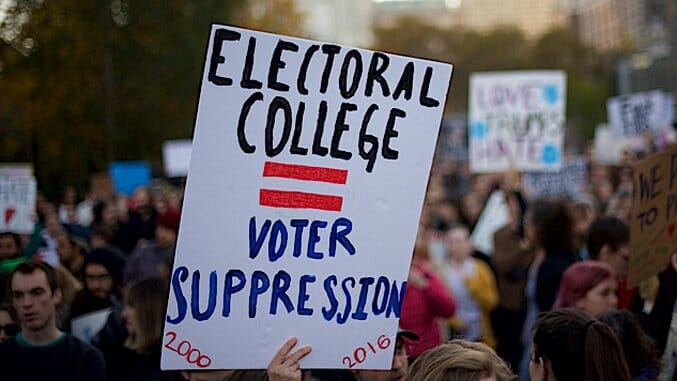Here’s What Would Have to Happen for the U.S. to Ditch the Godawful Electoral College
Photo by Mark Makela/Getty
Like many liberals, since Tuesday night I have drunkenly swerved across the five lanes of grief in mourning the loss of a country that apparently never existed—to the right’s delight, if Twitter is any indication. In two of these stages, Anger and Bargaining, the Electoral College has featured prominently.
As I come to grips with 11/9’s grim outcome, my anger sprays in many directions: Trump voters, of course; Stein and Johnson voters; non-voters; Comey; the media; and our old nemesis, the Electoral College.
I wasn’t old enough to vote for Al Gore, but even at 16 I knew the Electoral College was a stupid way to pick a President. I wrote a paper about it for my AP Government class, which probably holds up better than anything else I penned in adolescence. After all, my thesis has been vindicated twice since then in historically awful fashion.
As of this writing, Hillary leads the popular vote by almost one million votes. Experts estimate that when all the early and absentee votes are counted, she will win this (meaningless!) tally by more than two million votes and 1.7 percentage points. She will likely receive the third-most votes ever, behind Obama in 2008 and Obama in 2012. (I realize our population grows every year. But still.)
Millions more votes—and a loss. As a democracy, how do we justify this system?
In two of the past five elections, the candidate who received the most votes from the American people did not win the Presidency. Since the turn of the 21st Century, our general election has failed us 40% of the time. And given the razor-thin divide in the past five elections, it most likely will continue to fail us.
“Just think,” I texted my friend during Hillary’s heartbreaking concession Wednesday morning, “if not for the Electoral College, we’d be watching a victory speech right now.”
In the wake of Gore’s crushing “loss” in 2000 (the last time this happened), Senator-Elect Hillary Clinton said:
“We are a very different country than we were 200 years ago. I believe strongly that in a democracy, we should respect the will of the people and to me, that means it’s time to do away with the Electoral College and move to the popular election of our president.”
Christ, that hurts to read. Clinton supported an Electoral College reform bill cosponsored by Republican Ray LaHood and Democrat Michael McNulty. Obviously that measure did not advance.
In 2012, while under the mistaken impression that Mitt Romney would win the popular vote but lose the election, Donald J. Trump tweeted, “The electoral college is a disaster for a democracy.” Incredibly, Trump reiterated that stance in his 60 Minutes interview Sunday night. On this issue and this issue alone, the President-Elect and I agree.
-

-

-

-

-

-

-

-

-

-

-

-

-

-

-

-

-

-

-

-

-

-

-

-

-

-

-

-

-

-

-

-

-

-

-

-

-

-

-

-








































